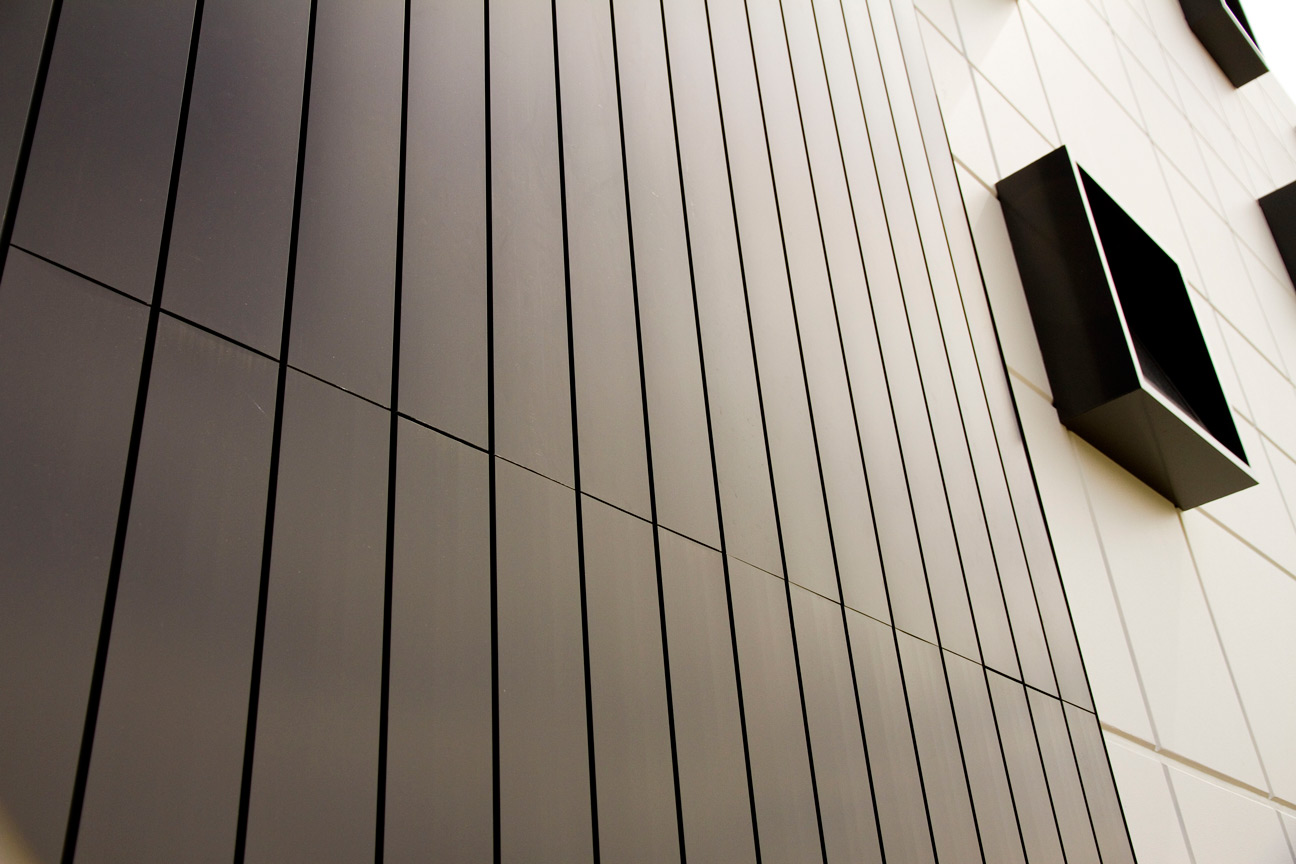Stryum Aluminium Cladding: Engineered to Resist Oil Canning and Deliver Lasting Performance

Discover the superior performance of Stryum aluminium cladding and why it outperforms its counterparts.
Traditional Steel Cladding & Oil Canning
Traditional steel cladding is a staple in construction, with its distinct industrial appearance complementing a wide array of architectural visions. Yet the outcomes are consistently compromised by one of steel's most significant pain points, oil canning, the visual phenomenon where metal panels appear wavy or distorted, undermining the design and detracting from the appearance of a structure.
At Fairview, we engineered a product that could achieve the same aesthetic while eliminating the risk of oil-canning. To assist with an in-depth comparison, view our 1-page data sheet contrasting Stryum to traditional steel cladding.
This resource provides a clear overview of performance metrics, durability, maintenance requirements, and compliance benefits, enabling more informed material selection.
| FEATURE | STRYUM | TRADITIONAL STEEL CLADDING |
| Corrosion Resistance | Excellent | Needs special consideration in highly corrosive environments |
| Perception | Premium Look | More Utilitarian |
| Lifespan | Lower maintenance, Longer lifespan | Higher maintenance - coating is susceptible to premature wear |
| Maintenance Needs | Doesn't rust or stain easily | Requires periodic inspection and touch-ups |
| Oil Canning Risk | Low | Higher Chance |
| Impact resistance | High - more resistant to impact | Low - susceptible to denting from impact |
| Compliance | Codemark Certified | No Codemark certified product available |
| Product Eco-system | Full suite of profiles and trims - tested as a system for weathertightness | Profiles and trims are typically not tested as a system for weathertightness |
Understanding Oil Canning and Its Causes
Oil canning is an inherent characteristic of light-gauge, cold-rolled flat metal products, often seen as waviness or distortion on the surface. It can occur with any metal type used in construction and is primarily a cosmetic issue that does not affect the structural integrity of the panel system. Several factors contribute to oil canning:
- Stresses during production: Issues like full centre, wavy edge, and camber can induce stress during the coiling process, leading to oil canning.
- Stresses during roll forming and slitting: Metals have a "memory" and tend to revert to their original form, causing waviness.
- Incorrect fastener installation: Over-driving or angling fasteners can stress the metal, leading to oil canning.
- Inadequate space for thermal movement: Metals expand and contract with temperature changes. Restricting this movement can result in oil canning.
- Structural changes: Building shifts or extreme weathering can cause tension in metal panels.
- Out-of-plane building structure: An uneven substrate can exacerbate oil canning, especially over long spans.
Further reading: What is oil canning and how to alleviate it?
Stryum ‘Shadow’ profile featured on the Whitelaw residential project in the ACT.
Stryum: Engineered for Performance and Precision
Stryum aluminium cladding offers a robust solution to the limitations of traditional steel. Engineered for superior performance, Stryum captures the aesthetic appeal of traditional steel-rolled sheets but adds the distinct advantages of solid aluminium.
One of the standout features of Stryum is its ability to eliminate oil canning. The material's robust profile and design prevent the flexing and distortion that cause this cosmetic issue. This ensures a clean, consistent finish that enhances the building's visual appeal.
Additionally, Stryum is fully CodeMark certified and tested for various performance metrics, including fire resistance (AS1530.1 and AS1530.3), impact resistance (AS1170.2), and cyclonic wind loading (AS4040.3). This makes it a reliable choice for diverse and demanding environments.

Stryum ‘Shadow’ profile featured on the Whitelaw residential project in the ACT.
Non-Combustible and Corrosion-Resistant: Key Benefits of Stryum
Stryum is non-combustible and corrosion-resistant, making it an ideal choice for modern construction. These properties significantly reduce the long-term maintenance costs and enhance the lifespan of the cladding.
- Non-combustible: Stryum's aluminium composition ensures it meets stringent fire safety standards, providing peace of mind in both residential and commercial applications.
- Corrosion-resistant: Stryum does not rust or stain easily, even in highly corrosive environments. This reduces the need for frequent inspections and touch-ups, offering a lower-maintenance solution compared to steel.
- Low maintenance: The material's resilience means it doesn't require the same level of upkeep as steel, translating to cost savings over the building's lifespan.

Stryum ‘Shadow’ profile featured on the Manuka Oval project in the ACT.
Case Studies: Proven Success in High-Profile Installations
Stryum's performance has been proven in various high-profile installations. For instance, the Manuka Oval in ACT, completed in 2019, utilised the Stryum Shadow profile on exposed elevations. The cladding has maintained clean lines and a consistent finish over time, achieving a dark finish without the aesthetic defects typically seen in metal cladding.
Another notable example is the Optus Stadium in WA, where a custom bronze Stryum profile was installed in 2018. After seven years in a high-exposure, high-traffic environment, the cladding has shown no rippling or oil canning, underscoring its durability and aesthetic appeal.
Custom Stryum panels featured on the Optus Stadium in WA.
Addressing Oil Canning with Stryum and Vitraloc
For those looking to delve deeper into the topic of oil canning, our detailed blog post "What is oil canning and how to alleviate it?" provides comprehensive insights. It covers the leading causes of oil canning and introduces Vitraloc, a steel cladding solution featuring innovative solutions such as the perforated S-Batten and Vitraloc Backing Strip, designed to mitigate oil canning.
Our comprehensive strategy addresses oil canning at every stage - whether you choose Stryum Interlocking Aluminium or Vitraloc Roll-form Interlocking Steel. Both product lines showcase Fairview’s commitment to innovation, high-performance building solutions, and enduring project value.




